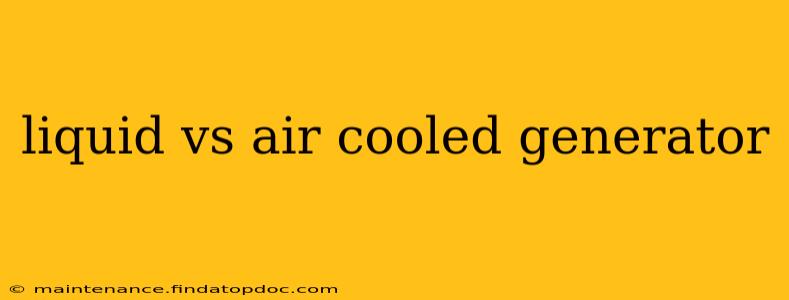Choosing between a liquid-cooled and an air-cooled generator can significantly impact its performance, lifespan, and suitability for your specific needs. This comprehensive guide will delve into the key differences, advantages, and disadvantages of each type, helping you make an informed decision.
What is a Liquid-Cooled Generator?
Liquid-cooled generators utilize a coolant, typically a mixture of water and antifreeze, to regulate the temperature of the engine's internal components. This coolant circulates through a system of passages within the engine block, absorbing heat and transferring it to a radiator, where it's dissipated into the atmosphere.
Advantages of Liquid-Cooled Generators:
- Higher Power Output: Liquid cooling allows for more efficient heat dissipation, enabling the engine to operate at higher temperatures and thus generate more power without overheating. This is particularly beneficial for larger generators and those operating under heavy loads.
- Longer Lifespan: The consistent temperature control provided by liquid cooling reduces thermal stress on engine components, leading to extended engine life and less frequent maintenance.
- Quieter Operation: The consistent temperature prevents the engine from working as hard, which can lead to a quieter running experience, especially beneficial in residential settings.
- Better Performance in Hot Climates: Liquid-cooled generators maintain optimal operating temperatures even in extremely hot environments, where air-cooled generators may struggle.
Disadvantages of Liquid-Cooled Generators:
- Higher Initial Cost: Liquid-cooled generators typically have a higher upfront cost due to the more complex cooling system.
- More Complex Maintenance: The cooling system requires regular maintenance, including coolant flushes and inspections, adding to the overall maintenance cost.
- Potential for Leaks: Leaks in the cooling system can lead to significant damage if not addressed promptly.
What is an Air-Cooled Generator?
Air-cooled generators rely on the natural convection and forced airflow to dissipate heat generated by the engine. Fans draw ambient air over the engine's fins, which radiate the heat into the surrounding environment.
Advantages of Air-Cooled Generators:
- Lower Initial Cost: Air-cooled generators are generally less expensive to purchase than liquid-cooled models due to their simpler design.
- Simpler Maintenance: Maintenance is less complex and generally less frequent than with liquid-cooled systems.
- Lightweight and Portable: The absence of a coolant system makes air-cooled generators lighter and more portable, ideal for applications requiring easy transportation.
Disadvantages of Air-Cooled Generators:
- Lower Power Output: Air cooling is less efficient at dissipating heat, limiting the engine's power output and potentially leading to overheating under heavy loads or in hot climates.
- Shorter Lifespan: The higher operating temperatures can put more stress on engine components, leading to a shorter lifespan compared to liquid-cooled counterparts.
- Louder Operation: The high-speed fans required for adequate cooling can make air-cooled generators noisier.
- Overheating in Hot Climates: They are more susceptible to overheating in hot and humid conditions.
Which Type of Generator is Best for Me?
The best choice depends on your specific needs and priorities:
-
Consider a liquid-cooled generator if: You need high power output, require a longer lifespan, prioritize quieter operation, operate in hot climates, or have a higher budget.
-
Consider an air-cooled generator if: You need a less expensive option, prioritize portability and ease of maintenance, and have less demanding power requirements.
What are the Different Types of Cooling Systems Used in Generators?
While the primary distinction lies between air and liquid cooling, there are variations within each category:
- Forced Air Cooling: This is the most common type of air cooling, utilizing fans to force air over the engine's fins.
- Natural Air Cooling: This method relies solely on natural convection to dissipate heat, which is less efficient and typically used in smaller generators.
- Closed-Loop Liquid Cooling: This system uses a sealed coolant system, preventing leaks and evaporation.
- Open-Loop Liquid Cooling: In this system, coolant is exposed to the atmosphere, making it more susceptible to contamination and evaporation.
How Do I Maintain My Generator's Cooling System?
Regular maintenance is crucial for both air and liquid-cooled generators. This includes:
- Regularly inspect: Check for any signs of leaks, damage, or debris buildup.
- Clean: Clean the cooling fins (air-cooled) or radiator (liquid-cooled) regularly to ensure efficient heat dissipation.
- Replace components: Replace worn-out parts as needed. For liquid-cooled systems, this includes periodic coolant changes.
By carefully considering the advantages and disadvantages of each cooling system and your specific requirements, you can choose the generator best suited to your needs and ensure reliable power for years to come.
